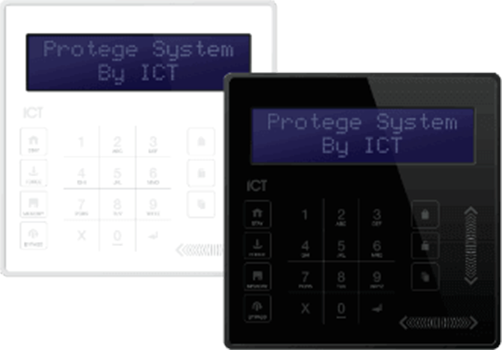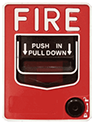Video MGMT System
 Access Control
Access Control
Voice & Data Wiring
 Burglar Alarm
Burglar Alarm
 Fire Alarm
Fire Alarm
Video MGMT System
Voice & Data Wiring
THOUGHT CENTER > Blog > Security Cameras
February 21, 2024
Mammoth Takeaways:
In today's fast-paced world, where security concerns are more important than ever, businesses must decide how far into the past they’ll keep security footage and how they’ll store it.
Deciding on the optimal duration for storing security footage isn't a one-size-fits-all scenario. It involves a delicate balance of technological capabilities, legal requirements, and practical necessities.
So, how do you navigate this complex landscape? Let's dive into the world of security cameras and unravel the mystery behind footage retention.

Did you know that, according to data collected by the FBI, there were over six million property crimes reported in the U.S. in 2022? It’s a staggering statistic that highlights the importance of security camera footage retention.
While there’s no one-size-fits-all answer, a general rule of thumb is for businesses to retain footage for one to three months, although some systems store footage for just 24 hours and others for a year or more.
Some security systems are designed for short-term storage, typically overwriting footage after 24 hours. These systems are often ideal for businesses that need to monitor activities in real-time, such as retail stores during business hours, but don't require long-term archival.
Loop recording is a common feature in many security camera systems. In loop recording, old footage is overwritten once storage is full. This method ensures continuous recording without manual intervention to clear space.
The duration before footage is overwritten can vary based on recording quality and storage capacity.
Lower resolution settings, lower frame rates, and motion-activated recording can all extend the time before storage is full or overwriting occurs.
Systems with large storage capacities or cloud-based solutions are ideal for businesses requiring extended footage retention. These can store footage for weeks, months, or even years.
In fact, many industries are required to store footage for set amounts of time.
Banking and Finance
Banks and financial institutions are often mandated to retain surveillance footage for at least 90 days. This requirement is to ensure a reliable record for investigating fraud or security breaches.
Casinos and Gaming
In the casino industry, regulations typically demand that surveillance footage be kept for a minimum of 30 days, with some jurisdictions requiring longer periods. This is crucial for monitoring gaming operations and preventing cheating or theft.
Healthcare Facilities
Hospitals and healthcare facilities usually need to keep their security camera footage for at least 30 to 90 days, in line with patient privacy and safety regulations. This helps monitor sensitive areas and ensure compliance with healthcare standards.
Camera settings affect the amount of video data produced, whereas storage devices affect the amount of data that can be stored before running out of space.
DVRs are traditional recording systems that connect to analog cameras and convert their signals into digital data for storage.
DVRs can be a cost-effective video storage option for small to medium-sized businesses that don’t require high-resolution video or extended storage.
NVRs work with digital IP (Internet Protocol) cameras and are more advanced than DVRs.
They support greater storage for high-quality digital footage and longer retention of video data.
VMS offers a comprehensive solution for digital video storage and management. They’re compatible with most cameras and can be integrated with additional security systems, such as those for access control and fire detection.
VMSes provide high-end, AI-based video management and storage, making them ideal for large organizations with complex security needs.
Cloud-based storage solutions represent the latest in security camera technology. They offer virtually unlimited storage capacity because, rather than using on-site devices, they use the Internet to store video data off-site (in “the cloud”).
While cloud storage can be costly for high-resolution and long-term storage, it’s a scalable, flexible, and reliable storage solution.
Here's the lowdown: Higher-quality footage takes up more space. Think of it as a trade-off—the clearer the image, the more storage you'll need.
If your cameras are recording 24/7, they’ll fill up storage faster than cameras set to record only when they detect motion.
Frame rate, often measured in frames per second (fps), refers to the frequency at which consecutive images, or frames, appear in a video.
It's like the speed of a flipbook: the higher the frame rate, the smoother and more fluid the motion appears in the video.
The frame rate significantly impacts storage duration because the more frames captured per second, the larger the file that must be stored.
At Mammoth Security, we understand that navigating security systems and the many choices they present can be daunting, but we’ve got your back. We’re here to help you figure out the perfect system for your unique security needs.
Mammoth Security is Connecticut's one-stop shop for commercial-grade security systems. Whether it's cutting-edge cameras, robust access control, or reliable fire and intrusion alarms, we approach your security as if it were our own—with seriousness, commitment, and attention to detail.
So, if you’re looking to build or upgrade a commercial-grade security system for your property, don't hesitate to reach out. We’re offering free site surveys and security assessments to businesses that contact us. Just click on the contact link and fill out the form.
NOT COMPLETELY SURE?
860-748-4292For businesses, security cameras should typically retain footage for one to three months. However, the ideal timeframe can vary based on specific business needs and the storage capacities of the system.
Loop recording in security camera systems is a feature where old footage is overwritten once storage is full. Loop recording ensures continuous recording without needing manual intervention to clear space.
Banks and financial institutions are often required to store security camera footage for at least 90 days to maintain a reliable record for investigating fraud or security breaches.
NVRs (Network Video Recorders) are advantageous for security camera storage because they work with digital IP cameras and support large storage capacities.
Cloud-based storage solutions enhance security camera storage by offering virtually unlimited storage capacity off-site. This makes it a scalable, flexible, and reliable option for security video storage.
Higher frame rates result in more frames per second, leading to larger file sizes and quicker consumption of storage space.
The duration for which security cameras can keep footage is determined by factors like storage capacity, recording quality, frame rate, and whether the recording is continuous or motion-activated.
DVRs (Digital Video Recorders) offer limited storage capacity and aren’t suited for businesses that require high-resolution video or extended storage periods.
Video Management Systems (VMSes) benefit large organizations by providing high-end, AI-based video management and storage, compatibility with most cameras, and integration options for additional security and building management systems.
Higher-quality footage requires more storage space, making the storage duration dependent on the image quality settings of the security camera.
Cloud-based storage is considered a reliable solution for security camera footage due to its virtually unlimited storage capacity off-site.
If security cameras are set to record 24/7, they will consume storage space faster than cameras programmed to record only upon detecting motion.